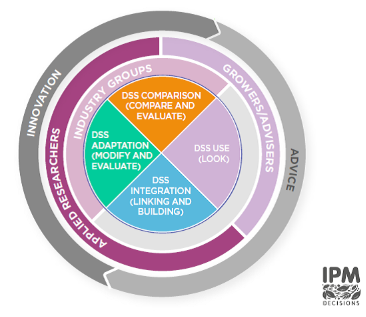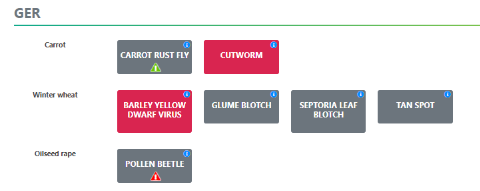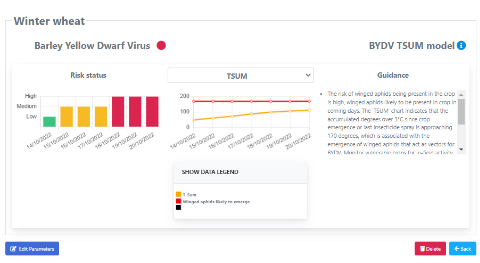
The Integrated Pest Management (IPM) Decisions platform provides access to a range of decision support systems (DSS) for integrated pest management that can be used across Europe. IPM and DSS are useful tools enabling farmers and advisors to improve the management of weeds, diseases and invertebrate pests of crops and this platform makes systems available across Europe for the first time. DSS that support decisions about the control of pests and pathogens can help the grower to reduce the application of unnecessary pesticides through improvements in the targeting of applications, resulting in both economic gain for the grower and environmental benefits.
After a quick and simple registration process, users have direct access to risk information from selected DSS relevant to their crops. On the platform, there is an instruction video about how to create an account and setup a farm.
The IPMDecisions platform is available at www.platform.ipmdecisions.net, and currently available in 11 European languages. Through a set of different dashboards developed, farmers can test and compare DSS for their own crops and in their native country; advisors can compare DSS for different client farms; researchers can develop a new DSS, adopt, and test DSS from other countries and finally adapt a DSS to their own country. In this way, the Platform provides farmers, advisors, and researchers with the ability to assess the reliability and suitability of different decision support systems so they can select those that are most suited to their needs.

The access to the Platform is free while the use of the DSSs integrated in the platform could vary according to the business model: it could be free, partially free, or a pay-to-use DSS. Further, the DSSs could link in different ways to the Platform, to be decided by the owner of each DSS. There could be:
- Fully open access DSS: users can run the DSS and researchers have access to modify parameters within the DSS to improve or adapt the system.
- Intermediate access: users can run the DSS and can modify only those parameters made available by the owner.
- Use access: users can run the DSS to guide decisions.
- Link: users access the DSS through a link to the owner’s own website. This will increase the visibility of the DSS to potential users but would not use the full functionality of the platform.
After creating an account and selection of relevant DSS, users have direct access to information and guidance on a growing number of pests on their crops. Grey coloured DSS are not active in this time of the year.

For each DSS additional detailed information is available, in this case for Barley Yellow Dwarf Virus, as illustrated below.

On its launch, on 19th of September, the DSS offered by the platform are:
- Barley Yellow Dwarf Virus (BYDV) in winter wheat and winter barley;
- Carrot rust fly in carrots;
- Potato late blight in potatoes, three different DSS;
- Codling moth in apples;
- Cabbage moth in several cabbage crops;
- Cutworm in various crops (lettuce, celery, brassicas, etc.);
- Fungal leaf diseases in winter and spring wheat (Zymoseptoriatritici, Parastagonosporanodorum and Pyrenophora triticirepensis);
- Downy mildew in lettuce;
- Saddle gall midge in spring wheat.
More DSS will become accessible before March 2023.
The platform is the result of a multi-actor approach. Design and functionality of the platform is based on input from farmers, advisors and developers. Therefore, in the first part of the project, the stakeholders have been involved in three sets of workshops aimed at understanding users’ needs, identifying the barriers to the adoption of DSS in general and of such kind of platform, and collecting stakeholders’ preferences on the lay-out of the platform. In the second part of the project, the stakeholders will continue to be involved to foster the uptake of the Platform facilities.
IPM Decisions is a 5-year project that began in June 2019. It is co-ordinated by Dr Neil Paveley, Crop protection, ADAS (part of RSK Environment Ltd.), UK. The project has been granted €5million and consists of 27 partners from 12 different European countries and two pan-European companies.
__________________________________________________________________________________________
This article was written by:
Harm Brinks, working for Delphy, advisory services based in Wageningen The Netherlands. Project manager, specialist for sustainable cropping systems in open field plant sectors.
Rita Gentili, Project officer at Ager Srl, the consultancy and research company of Confederazione Nazionale Coldiretti, the biggest farmer’s organization at Italian and European Level.


